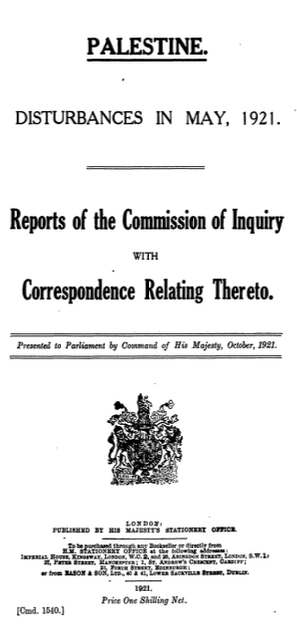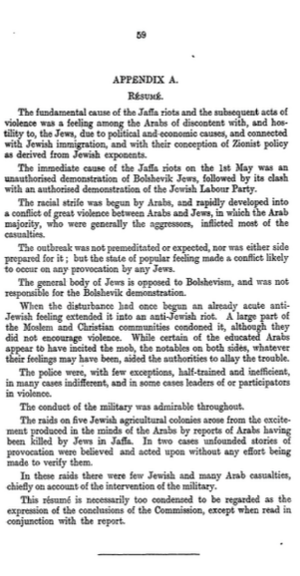Haycraft Commission facts for kids
The Haycraft Commission of Inquiry was a special group set up to investigate the Jaffa riots of 1921. These riots were violent events that happened in May 1921. The commission's job was to find out why they happened.
The commission's report was called "Palestine: Disturbances in May 1921." It said that Arabs were responsible for starting the violence. However, it also listed many reasons why Arabs were unhappy. They felt their interests were being ignored compared to the interests of Jewish immigrants. At that time, Jewish people were about 10% of the population and growing fast.
Some steps were taken to make Arabs happier. But Jewish communities were also helped to get weapons for defense. In the end, many of the report's suggestions were not followed. Publishing the report was seen as a way to calm things down.
Contents
How the Commission Worked
The commission was led by Sir Thomas Haycraft. He was the Chief Justice of the Supreme Court in Palestine. Other members included H. C. Luke, who was an assistant governor in Jerusalem, and J.N. Stubbs from the Legal Department.
Different groups in Palestine had representatives on the commission. Muslims were represented by 'Aref Pasha al-Dajani. Christians had Ilyas Effendi Mushabbak. Jewish people were represented by Dr. Mordechai Eliash. The commission finished its work and published its report in October 1921.
What Was Happening Before
The riots happened during a time when Palestine was under military control. This was before the League of Nations officially approved British rule. It was also before the start of the British Mandate, which was when Britain officially governed Palestine.
Sir Herbert Samuel had just been made the top British official, called the High Commissioner. Many people, especially the Arab majority, were very unhappy about this. This was because he was known to support Zionism, which was a movement to create a Jewish homeland in Palestine.
Right after the riots, Samuel needed armored cars to travel safely. He also had to promise to create a national government.
What the Commission Found
The report said that the violence by Arabs against Jews seemed to start from a fight. This fight was between two Jewish groups: the Jewish Communist Party (called MPS) and the official Jewish Labour Party. However, the report stated that this fight "could not have been enough to cause more than a normal street riot."
The report listed the main reasons why Arabs were unhappy:
- The British government in Palestine, now led by a Zionist, seemed to focus mainly on creating a Jewish National Home. Arabs felt it was not for the equal benefit of all people in Palestine.
- An official group advising the government, called the Zionist Commission, seemed to put Jewish interests above everyone else's.
- There were too many Jewish people in government jobs.
- Arabs believed part of the Zionist plan was to bring in many people with "better business and organizing skills." They feared this would eventually make Jewish people more powerful than others.
- Arabs saw the immigrants as an "economic danger." They felt the immigrants competed unfairly and were favored.
- Immigrants sometimes upset Arabs with their "arrogance" and by not respecting Arab social customs.
- Some immigrants who supported communism were allowed into the country without enough checks. This led to social and economic problems in Palestine.
Some Jewish people told the commission that the problems were caused by a small group of Arabs. These Arabs supported the old Ottoman rulers and missed their power. But the commission disagreed. They believed the strong feelings against Jews were "too real, too widespread, and too intense" to be explained so simply. Any anti-British feelings among Arabs came from Britain's support for Zionism.
The report clearly stated that the "racial conflict was started by the Arabs." It also said that the "Arab majority, who were usually the attackers, caused most of the injuries." Five Jewish farming communities were attacked. However, in these attacks, there were few Jewish injuries and many Arab injuries. This was mainly because the military stepped in.
The report also noted that almost all non-Jewish people were united in their dislike of Jews. This included Muslims, different Christian groups, and others.
Dr David Eder, who led the Zionist Commission, spoke to the committee. He said that only Jewish people should be allowed to carry weapons. He also said that "there can only be one National Home in Palestine, and that a Jewish one." He believed there should be no equality between Jews and Arabs. Instead, he thought Jewish people should become more powerful once their numbers grew enough.
What Happened After
Sir Herbert Samuel quickly started a plan to defend Jewish settlements. Each community was given armbands and rifles with ammunition. Even though these weapons were supposed to be controlled, giving them out made the earlier, unofficial formation of the Haganah (a Jewish defense group) seem acceptable.
Arab education had been a big complaint. They felt they had better opportunities under the old Turkish rule. Improvements were made, but the money for them ran out after a year. In December 1921, Samuel claimed he had solved a land problem in Beisan in favor of the Arab farmers.
On June 3, 1921, Samuel gave the first official explanation of the Balfour Declaration. This was a statement that supported a Jewish homeland. He promised Arabs that immigration would be controlled based on how many people the country could support economically. He even stopped immigration for a short time. He also quickly set up the Supreme Muslim Council, but he limited its power to only religious matters.
A very important suggestion was to change the special role of the Zionist Organisation. The idea was that the country should be governed with help from a group that represented everyone. These ideas made Zionists very unhappy. Chaim Weizmann, a Zionist leader, even suggested that Samuel should be replaced as High Commissioner. Meanwhile, Arabs demanded that Samuel and his legal adviser, Mr. Bentwich (who was also a Zionist), be removed. Arabs felt they were "victims of Zionist pressure on the Government." They believed that "nothing less than changing the Jewish policy and having some form of fair representation will make things better."
In his report for June 1921, Samuel told the Colonial Secretary Winston Churchill about his new plan. He wrote that since his speech on June 3, the Jewish population had been "very nervous and worried." They saw his speech as a "major setback" to their hopes. However, he said this feeling had "changed a good deal" since Jewish communities were "given weapons (with strict rules on how to use them for self-defense)."
Another outbreak of violence happened on November 2, 1921. This was the fourth anniversary of the Balfour Declaration. Private letters within the Colonial Office suggested that the Zionist Commission was making it seem like the British government "was completely controlled by the Zionists." They suggested that Samuel's statement on June 3 was just to trick people. They also implied that all laws in Palestine were, and would continue to be, made to benefit Zionist interests.
See also
- Zionism
- Anti-Zionism
- Timeline of Zionism
- 1920 Palestine riots
 | Jackie Robinson |
 | Jack Johnson |
 | Althea Gibson |
 | Arthur Ashe |
 | Muhammad Ali |



